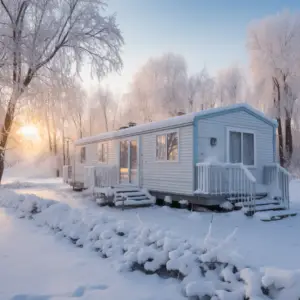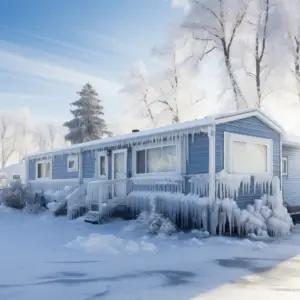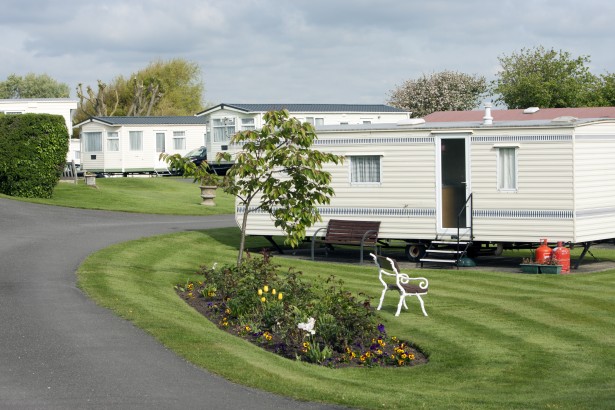Preventing Frozen Pipes in Mobile Homes, One of the prevalent issues with a mobile home is frozen pipes. There is nothing stressful as waking up on a chilly morning only to realize there is no water from your faucet. To make it worse is the idea of crawling around the ice to look for the frozen pipes.
Therefore, prevention measures are significant before the winter season and throughout the cold months to secure your home’s water pipes by keeping them warm regardless of the weather. There are multiple options on how you can achieve that with ease.
Preventing Frozen Pipes in Mobile Homes stuck on the hacks you can use to prevent your pipes in a mobile home from freezing; you’re on the right page and place. Let’s uncover the details.
Table of Contents
How To Keep Pipes From Freezing Under Mobile Home: Why it is a Concern

Before we look at various ways to prevent pipes from freezing, it is significant to understand why it is crucial. Apart from the water not coming out of the faucets, freezing can extend tremendous damage to your home.
Water expands with a tremendous force when it is frigid. As a result of much pressure, the pipes balloon, and less space in a closed system such as the mobile home pipes.
Some of the pipe materials can stretch before rupturing, like PEX. Others like Galvanized iron, CPVC, PVC, and polybutylene (gray) rupture. Worse is the copper pipe, which extends a long pipe segment before splitting into a small area, making it hard to repair.
Using more petite and thin materials in mobile home pipes is susceptible to freezing. Thus, it would be best to take precautions to keep them from freezing.
How Do You Prevent Your Pipes From Freezing?
Because of the above-explained reasons, you need to take preventive measures before even the winter season hits constantly. Here is a detailed list you can use to combat this issue before the cold sets in:
Check Out Your Skirting
Unlike the built foundation, inspect your skirting keenly for cracks and gaps that might allow freezing blasts into the underneath space where the pipes are installed. If there are holes in the skirting, you will have to replace that section and for minor fixes, use the clear weather-resistant tape.
Ensure your home skirting vents are closed during the cold season. If your room contains automatic vents, they will shut themselves, while the manual ones should be closed manually. However, remember to reopen when the season warms up.
Install Water Alarms
Place flood and freeze sensors in your home to monitor low and high temperatures 24/7 and notify you whenever a problem arises.
When the alarm detects an issue, the pre-programmed number on the device will receive a call. It is designed to secure your house and offer additional protection to your family valuables.
Check and Test the Heat Tape
This step is very paramount to winterizing. Heat tape is a kinder cable wound around exposed pipes while connected to the electricity supply—the thermostat on the heat tape presses against the tube.
Electricity runs through the heating element in the cable, warming the cold pipes to prevent them from freezing. Ensure the heat tape is connected to the exposed pipes outside your mobile home, as it doesn’t last forever.
At the beginning of each winter, it is advisable to test the heat tape to ensure it is well plugged and press the thermometer again with a bag of ice.
Preventing Frozen Pipes in Mobile Homes heat tape and thermostat are functional, the heat tape will be warm to the touch, but if it is still cold after 30 minutes, you must replace it.
Pipe Insulation
You need to add more layers not only to yourself but also to the pipes. Slipping foam insulation sleeves on the open lines outside and underneath your mobile home will prevent water from moving in.
If the pipes don’t have insulation foam, they’re layered on top of the heat tape. You’re required to measure the pipe’s width, including the heat tape, to choose the right-size insulation to get a snug fit.
Drip the Faucet
It may not favor you in terms of the bill or the eco-friendly. You may leave one of your pipes open to a trickle when the temperatures are way below freezing. Run a small amount of water through your pipes to avoid freezing.
How to Locate Frozen Pipes in a Mobile Home

Identifying where the frozen pipes are is tricky and nearly impossible to sort out. Before troubleshooting any problem, you must understand your home’s plumbing system.
The primary sign of a frozen pipe is the lack of water from your faucet. Fixing the faucet issues will be arduous when you don’t know which water line is causing problems. Therefore, turn on all the taps in your home.
If the water doesn’t come out, the issue would probably be from the main water supply (where all your pipes join).
If the issue is with one faucet, check to establish the root cause.
A Quick Glance on how you Can Detect a Frozen Pipe
You may opt to use an infrared thermometer to detect the colder areas and quickly respond.
Suppose leaks and cracks on your pipes indicate that the tube is under pressure. Turn off the main valve and replace the damaged water pipe immediately.
Open the faucet running and run your hands over the pipe; you may feel the parts with the running water.
Try to hit the pipe with a hard object, like a screwdriver, at different intervals. Frozen pipes produce a different sound which is less hollow than unfrozen ones.
How to fix frozen Pipes
- Thaw the frozen pipes using salt
- Use a hair dryer or heat gun
- Wrap pipes in hot towels
- Apply heat tape to the pipes
To unfreeze pipes is a challenge in a mobile home, more so when you have no idea where to start. The best option is to learn to prevent freezing in the first place. Practice regular maintenance, and if you notice a frozen pipe take action to sort it out immediately.
Nevertheless, to avoid taking care of the significant issues, winterize your mobile home to help prevent frozen pipes. There are several ways, like insulation, heat tape, and running water, which you can implore when winter approaches.


